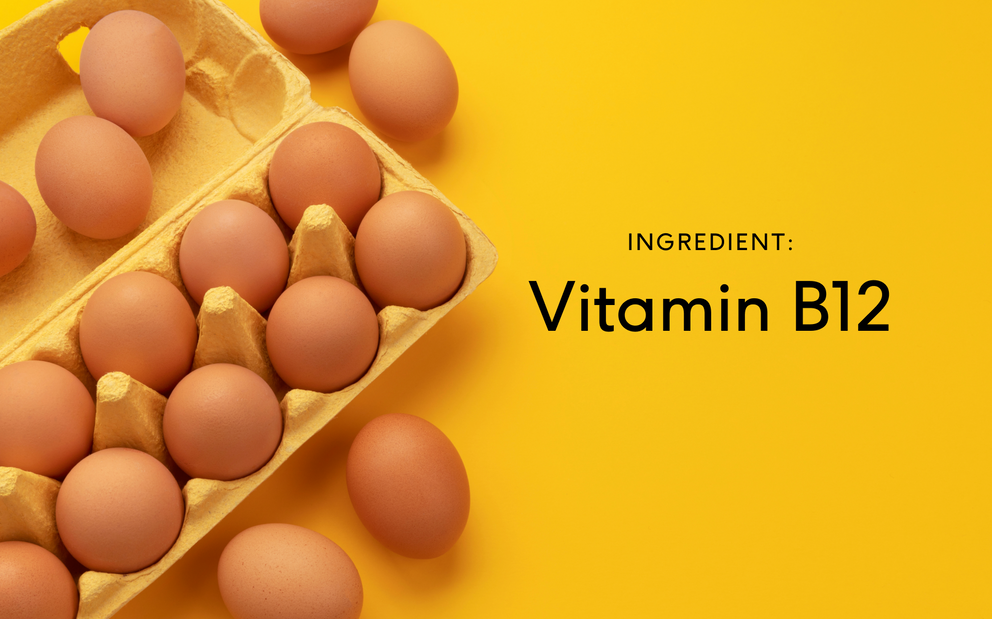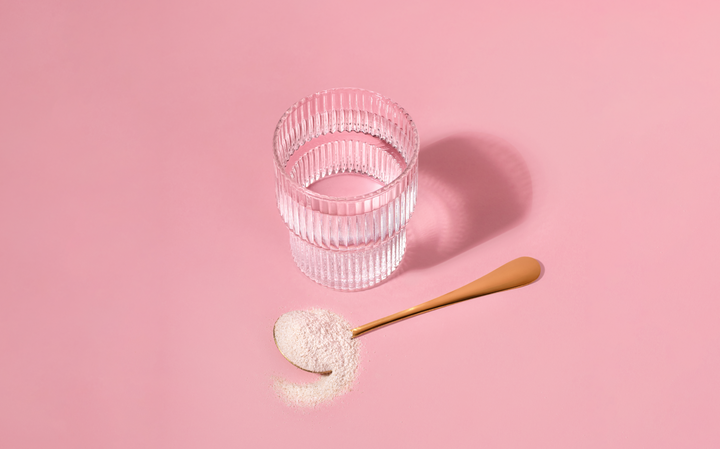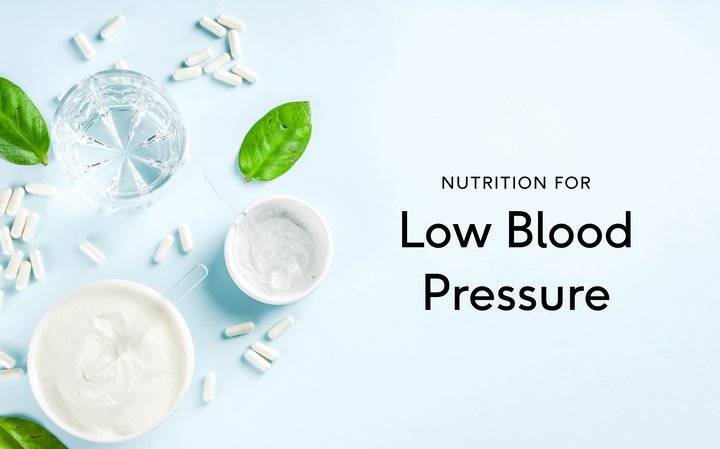Learn About Vitamin B12 in 5 Minutes
Table of contents

What is vitamin B12?
Vitamin B12 (cobalamin) is an essential components of the B vitamin complex for health and well-being. It’s just as easy to become anaemic from B12 deficiency as it is from iron deficiency, and this nutrient also prevents osteoporosis, birth defects, macular degeneration, and fatigue.
- Stimulates red blood cell production to prevent anemia
- Keeps pregnant women healthy to prevent birth defects
- Low levels of vitamin B12 can contribute to osteoporosis
- Protects your eye health to prevent macular degeneration
- Prevents depression and improves your mood
- Vitamin B12 deficiency makes you fatigued
- Reduces homocysteine to promote heart health
- Keeps your hair and skin healthy
Why we love vitamin B12
There’s a reason that vitamin B12 is one of the most celebrated components of the B vitamin complex. This natural nutrient has an incredibly diverse array of benefits that can help you feel better, work harder, and live longer.
Vitamin B12 protects you from coronary heart disease, increases your red blood cell counts, and interacts positively with your nervous system to make you feel healthier and more capable of tackling the world. This nutrient even makes you look better by increasing the quality of your skin and nails, and it may even prevent some of the eye conditions that commonly affect older people.
Unbelievable benefits of vitamin B12
Without vitamin B12, Feel simply wouldn’t be complete. Here are some of the top science-backed reasons why you need to consume your recommended dose of this nutrient every day:
Cardiovascular Benefits
Your body needs vitamin B12 to produce healthy red blood cells. Without enough of this vitamin in your system, your blood cells will become bloated and elongated, and they’ll have trouble moving through your arteries and veins. This condition is called megaloblastic anemia, and it prevents your blood from moving oxygen to the various organs and tissues within your body.
Additionally, vitamin B12 reduces the levels of homocysteine in your body. When your homocysteine levels are too high, this amino acid can harm your heart health and lead to coronary heart disease. If you allow coronary heart disease to progress, this condition could lead to heart failure.
Bone Benefits
People with low levels of vitamin B12 are more likely to have decreased bone density. When your bones lose density, they become more fragile, which makes fractures more likely. The correlation between low vitamin B12 levels and increased risk of osteoporosis is highly evident in women, but adults of both sexes should take plenty of vitamin B12 to stave off the dangers of osteoporosis.
Reproductive Benefits
Supplementing with vitamin B12 while pregnant can reduce the risk of neural tube defects in babies. When you don’t have enough vitamin B12 while you’re pregnant, your risk of miscarriage and premature birth also increases.
Neurological Benefits
While scientists aren’t certain how vitamin B12 improves your mood, this nutrient appears to reduce the symptoms of depression. Additionally, research found that women who are deficient in vitamin B12 are twice as likely to be depressed.
Vitamin B12 has been shown to effectively improve cognitive function, which is why we've included 1.5μg of Vitamin B12 in Feel Focus, 60% of your daily recommended intake.
Eye Benefits
Macular degeneration is an age-related eye disease that makes it harder to see things in the center of your field of vision. Research indicates that getting enough vitamin B12 in your diet reduces your risk of macular degeneration by 41 percent.
Hair and Skin Benefits
When you’re deficient in vitamin B12, supplementing with this nutrient can improve your skin and hair health.
Is vitamin B12 water-soluble or fat-soluble?
Cobalamin is highly water-soluble, which means that it dissolves in your body quickly and doesn’t stay in your tissues for a long time.
Where can vitamin B12 be found naturally?
Vitamin B12 is present in most animal products, but this essential nutrient isn’t found naturally in any plant foods. Fortified breakfast cereals, grains, and nutritional yeasts contain vitamin B12, but it’s been very hard for vegetarians and vegans to get enough of this essential nutrient.
It may be essential for people following a vegetarian or vegan diet to take a supplement containing vitamin B12. Feel Multivitamin contains 60μg of vegan Vitamin B12, perfect for easily reaching your daily recommended intake.
5 foods/drinks containing vitamin B12
1. Clams 1400% DV per 85g or 1.5 medium-sized clams
2. Beef liver 1200% DV per 85g
3. Eggs 10% DV per large egg
4. Milk 18% DV per 1 cup
5. Nutritional yeast 100% DV per 5g
What is the recommended daily intake for vitamin B12?
The nutrition scientists at the National Institutes of Health (NIH) suggest that adult men and women should consume 2.4mcg of vitamin B12 per day. This recommended daily amount (RDA) jumps to 2.6mcg for pregnant women and 2.8mcg for women who are lactating. However, please note there is no upper level set for B12, and on average people who consume meat regularly receive times more than the daily RDA. Most people on meat and fish free diets are likely to be B12 deficient, so we recommend an increased intake of this nutrient.
What to consume to get a full daily dose of vitamin B12?
Clams - around 6g
Beef liver - around 7g
Eggs - around 10 large eggs
Milk - around 5½ cups
Nutritional Yeast - around 1 spoon
Can you absorb enough of vitamin B12 from food?
For people who don’t eat animal products, getting enough vitamin B12 from food is very difficult. Even for omnivores, it’s necessary to incorporate clams, beef liver, or fish into your diet every to get adequate levels of cobalamin.
Why is vitamin B12 necessary for your body?
In addition to being necessary for red blood cell production, vitamin B12 is also an essential catalyst for DNA and neurotransmitter production. If you don’t eat enough vitamin B12, your DNA will degrade, your lifespan will shorten, you’ll become anaemic, and you’ll develop psychiatric conditions.
Functions of vitamin B12
Blood cell production: Your body needs vitamin B12 to produce red blood cells, which are the primary components of your blood that carry energy throughout your body.
DNA production: Without vitamin B12, your body won’t be able to synthesise DNA, and reduced DNA synthesis interferes with cell replication and reduces your longevity.
Neurotransmitter production: Vitamin B12 is vital for the production of most neurotransmitters. You’ll develop psychiatric conditions and have trouble with focusing and memory if you don’t get enough of this nutrient.
Bone density benefits: People who don’t consume enough vitamin B12 are more at risk of osteoporosis.
Symptoms of vitamin B12 deficiency
Fatigue
The most common symptom of anemia, which can be caused by B12 deficiency, is fatigue. Anemia can also cause muscle weakness and fainting.
Pale Skin
Decreased red blood cell count caused by anemia can make you look pale and sickly.
Increased Heart Rate
To make up for the decreased levels of red blood cells caused by vitamin B12 deficiency, your heart might start to beat faster. This increased strain on your heart increases your risk of cardiovascular disease, and it can also cause inflammation in your blood vessels.
How long do you need to take vitamin B12 to start experiencing its benefits?
It’s generally possible to start seeing some benefits from vitamin B12 immediately after you start supplementing with this nutrient. Prolonged deficiency in B12, however, can cause serious medical conditions that take a long time to recover from.
Consistency is key and our research recommends taking your Feel supplements for at least 3 months to allow your body to adjust and provide the desired benefits.
How long does it take for your body to digest/absorb vitamin B12?
While your body absorbs vitamin B12 quickly, this nutrient isn’t absorbed as efficiently as some of the other components of the B vitamin complex. Some sources indicate that your body only absorbs about 50% of the vitamin B12 you consume, and this absorption rate drops off even further when you consume more B12 than your body can process.
How long does vitamin B12 stay in your body after you take it?
Vitamin B12 doesn’t generally build up in your bodily tissues. In the case of severe overdose, however, this substance might build up to dangerous levels.
Is vitamin B12 an antioxidant?
Vitamin B12 deficiency results in severe oxidative stress, which indicates that this substance serves as an antioxidant. Like other antioxidants, vitamin B12 fights back against free radicals, which damage your cells.
Can you overdose on vitamin B12? What are the effects?
Overdosing on vitamin B12 once isn’t considered to be very dangerous since your body eliminates this substance quickly. When you overdose on B12 over and over again, however, you are at a greater risk of developing colorectal cancer, and too much vitamin B12 might make diabetes and kidney disease worse. Avoid these symptoms by only consuming your RDA of this essential nutrient.
Does vitamin B12 dissolve, flush out, or build up in the body?
Generally, vitamin B12 dissolves and flushes out of your body quickly. This nutrient might build up in your tissues in cases of repeated overdose.
Can you take vitamin B12 during a diet?
There’s no reason you shouldn’t take vitamin B12 during a diet.
Are there synthetic forms of vitamin B12?
Cyanocobalamin is a synthetic form of vitamin B12. It is used in most supplements containing this essential vitamin.
Why might synthetic forms of vitamin B12 be better?
As compared to the natural form of vitamin B12, methylcobalamin, cyanocobalamin is more stable and cost-effective.
Absorption rate of synthetic vitamin B12
All available data indicate that methylcobalamin and cyanocobalamin have roughly equal absorption rates.
Why might natural forms of vitamin B12 be better?
There are no known advantages of consuming natural forms of vitamin B12.
How to take vitamin B12
Vitamin B12 can be consumed either in supplements or in food.
Vitamin B12 trends in medicine
A 2019 study found that deficiency in vitamin B12 leads to increased likelihood of infection with pathogens. This research examines the hitherto largely unexplored relationship between vitamin B12 and your immune system, and it simply underscores the importance of incorporating plenty of this essential nutrient into your diet.
Why everyone should be taking WeAreFeel supplements
While vitamin B12 is one of the most important essential nutrients, it’s also one of the nutrients you’re most likely to be deficient in. Vegetarians and vegans are particularly at risk of vitamin B12 deficiency; part of the reason that so many people who don’t eat animal products are anaemic is that they don’t get enough vitamin B12. Simply taking an iron supplement won’t help with your anemia if you don’t incorporate more vitamin B12 into your diet.
At the same time, you don’t want to overdo it with this nutrient. The U.S. Food and Drug Administration (FDA) recently reduced the RDA for vitamin B12 from 6mcg to 2.4mcg, which just goes to show that recent research has been bringing attention to the dangers of taking too much of this nutrient. Free yourself from dependence on animal products and avoid the dangers of overdose with Feel!
Here’s the Proof
- Measurement of red blood cell-vitamin B12: a study of the correlation between intracellular B12 content and concentrations of plasma holotranscobalamin II.
- Genetic Associations with Plasma B12, B6, and Folate Levels in an Ischemic Stroke Population from the Vitamin Intervention for Stroke Prevention (VISP) Trial.
- Low plasma vitamin B12 is associated with lower BMD: the Framingham Osteoporosis Study.
- Low serum vitamin B-12 levels are associated with increased hip bone loss in older women: a prospective study.
- Effects of folate and vitamin B12 deficiencies during pregnancy on fetal, infant, and child development.
- Vitamin B12 Supplementation in Treating Major Depressive Disorder: A Randomised Controlled Trial
- Vitamin B(12) deficiency and depression in physically disabled older women: epidemiologic evidence from the Women's Health and Ageing Study.
- Folic Acid, Vitamin B6, and Vitamin B12 in Combination and Age-related Macular Degeneration in a Randomised Trial of Women
- Reversible hyperpigmentation of skin and nails with white hair due to vitamin B12 deficiency.













































 Back
Back





